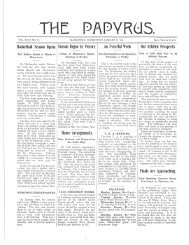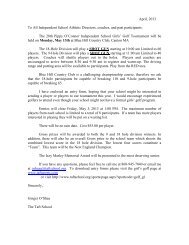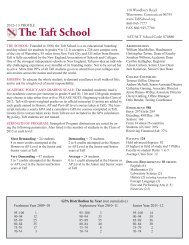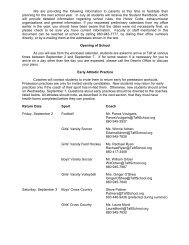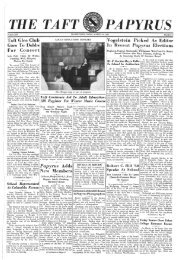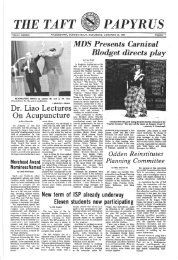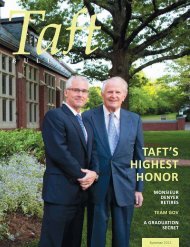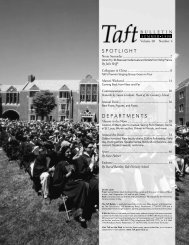L E T T E R SFrom the EditorSome of you may remember our coverageof spring break trips offered by<strong>Taft</strong> in recent years—and March wasjust as busy this year. In addition tothe Collegium tour that Bruce Fiferhas been organizing for the last decadeor more, TJ Thompson took the jazzband to perform on Beale Street inMemphis. <strong>The</strong> Orphanage Outreachtrip to the Dominican Republic is inits fourth year, and last year’s leadershipand democracy-in-action program toSouth Africa was so popular that it wasrepeated this spring as well (see insideback cover for photos).Of course spring training is as popularas ever (and a number of studentsmanaged to participate in both kinds oftrips) with baseball, lacrosse and crewall traveling to Florida for a few days ofgood weather to jump-start the season.This issue includes a wrap-up of thewinter season, but if you want to seehow the spring teams are coming along,please check out <strong>Taft</strong>Sports.com.Taking a cue from my brother-inlawHenry Reiff ’71 (see “Going BackHome,” fall 2007) I was able to spend afew hours hanging drywall in the UpperNinth Ward while attending an alumnimagazine conference in New Orleansin March. Although we weren’t able tofinish much in a short period of time,it was powerful to see such an infamousplace firsthand, even so long afterKatrina. And I also gained a newfoundappreciation for how service-orientedtrips can open our students’ eyes andadd more to their education than wecould ever do on campus.And the trips don’t end here.In June, another group will head toGuatemala to help in community projectsthere—not to mention the Pageand Poole Fellows and Kilbourne ArtsFellows, who are busy planning theirsummer. <strong>The</strong> learning never ends.—Julie ReiffCum Laude?<strong>The</strong> attitude of the school to the fact that allCum Laude inductees were girls seems to beone of mild indifference, if not amusement.I find it downright distressing. What’s happeningto our boys?—John W. Elder ’45At the WadeAll the guys at the Wade House (winterBulletin, page 68) are from the Class of ’65,not ’60. Since we could not smoke until wewere seniors, this photo must be 1964 or ’65.<strong>The</strong> person standing is Derek McDonald;Charlie Jacobson is smoking the cigar.—Guy Hatfield ’65Regarding Study HallDuring my tenure at <strong>Taft</strong>, mids and lowermidswere required to spend their freeperiods there (see winter issue, page 32), Ibelieve without exception during class time,but if their grades were good enough, theycould skip the afternoon 5:15 to Vespersand night 7:00–8:30 ones, but they wererequired to be in their rooms. As I recall, thelibrary was not an acceptable place to be.For uppermids and seniors, if yourgrades were bad enough, and mine werealmost the entire time, you had to attendstudy hall. <strong>The</strong>y had to really be bad to haveto go during class time on your free periods,but I spent most afternoon and evenings instudy hall rather than in my room.<strong>The</strong> lowermids sat to the front andmids in the rear half. <strong>The</strong>re were assigneddesks. And, yes, we wore coat and tie to eachand every one. <strong>The</strong> big joke was to steal analarm clock and either put it in a drawer inthe master’s desk or under the platform andset the alarm to go off during the study period.Apparently, study hall duty was rotatedamong the more junior masters.I found I could daydream just as well instudy hall as in my room. I taught myself theGreek alphabet from the back of a trig tablebook one period instead of studying what Ineeded to be studying. I do still remember it.Where were the exams administeredwhen Mr. Potter co-opted the study hall?We had all the exams with the famous littleblue books in that room—bar none.—Tommy Hickcox ’57A Good SoakingIn the picture of students shoveling snow(page 68) the caption indicates that this waspart of the Job Program. In my day, 1945–49,it did not include any outdoor work—especiallynot snow shoveling which could not beanticipated two weeks in advance.My guess is that these boys were shovelingsnow instead of participating in theirrequired athletics that day. We had to playeither football or soccer in the fall; hockey,—continued on page 35Love it? Hate it?Read it? Tell us!We’d love to hear what you think aboutthe stories in this Bulletin. We mayedit your letters for length, clarity andcontent, but please write!Julie Reiff, editor<strong>Taft</strong> Bulletin110 Woodbury RoadWatertown, CT 06795-2100or ReiffJ@<strong>Taft</strong><strong>School</strong>.org<strong>Taft</strong> TriviaCan you name <strong>Taft</strong>’s legendary hockey coach who earned the nickname“Winter God”? If you need a hint, check out the photo on page 34. Send a cardor e-mail to the address above with your answer. A <strong>Taft</strong> luggage tag will be sentto the winner, whose name will be drawn from all correct entries received.It looks like the multiple-choice question from last issue was still toodifficult for most readers. <strong>The</strong> Parents’ Association Field House, whichneighbors Rockefeller football field, was built in 1938. I hope more of youwill play <strong>Taft</strong> Trivia this time! <strong>Taft</strong> Bulletin Spring 2008
j Steve Erlanger ’70, in the oldcity of Jerusalem, gets ready tomove to Paris after four yearsin the Middle East as New YorkTimes bureau chief. Rina CastelnuovoFrom Jerusalem to Paris<strong>The</strong> first piece Steve Erlanger ’70 wroteas Jerusalem bureau chief for the NewYork Times was about a roadside bombing,and there’s been no shortage ofnews in the four years since: the deathof Yasser Arafat, Ariel Sharon strugglingfor life after a massive stroke, Israel’swithdrawal from Gaza, and Hamas’ victoryin the Palestinian elections.As he packed for the move to becomethe paper’s Paris bureau chief,National Public Radio’s “Talk of theNation” asked Steve about the chancefor a peace agreement. “<strong>The</strong>re’s a longway to go,” Steve said, “Peace is notcoming soon, I promise.”Despite that sober summary, Steveoffered this observation:“Gaza is fascinating, somethingnew in the world,” he said. “It’s a semistate,it’s semi-occupied and it’s in thecontrol of a group that by the U.S. andthe European Union and Israel is considereda terrorist group…. Gaza seemsto be pulled apart from the West Bank,so it’s making the idea of a future of aPalestinian state, which George Bush favors,seem more divided, farther away.”Steve was interviewed on OpenSource back in January about GeorgeBush’s legacy in the Middle East:“Whatever you thought of the Annapolismeeting, the United States snappedits fingers and within a week got 49countries to come to Washington, includingthe Saudi foreign minister andthe Syrian deputy foreign minister. Thatwas power,” said Steve. “That power hasnot disappeared. George Bush may beconsidered—particularly at home—aweak figure, and abroad he may behated by many people. But this notionthat American power is down the drainis simply wrong.”Steve got his start in professionaljournalism as a correspondent for theBoston Globe while still a teaching fellowat Harvard. He joined the Times asa metropolitan reporter in 1987, butsoon became Bangkok bureau chief andhas since served as Moscow bureau chief(the post he held when Barclay Johnson’53 interviewed him for the spring 1995Bulletin), chief diplomatic correspondentin Washington, bureau chief forCentral Europe and the Balkans andBerlin bureau chief.Is it depressing to report from theMiddle East? NPR asked. “It’s also enthralling,”said Steve. “I like reportingfrom places where there are real problems,not just whether you have a latteor something. People live at an edge.<strong>The</strong> Palestinians have enormous problemsand yet they are willing to talk toyou, they’re hospitable. <strong>The</strong> Israelis havereal enemies in the region but they’revery talkative and eager. It’s a fascinatingstory; it’s just not one that’s going to endvery quickly. What depresses me sometimesis feeling that when it’s not goinganywhere quickly, that I’m just cataloginguseless death. That is depressing.”To listen to these interviews, orread recent articles by Steve, or any,in fact, from his two decades with theNew York Times, visit <strong>Taft</strong>Alumni.comfor the links.<strong>Taft</strong> Bulletin Spring 2008



